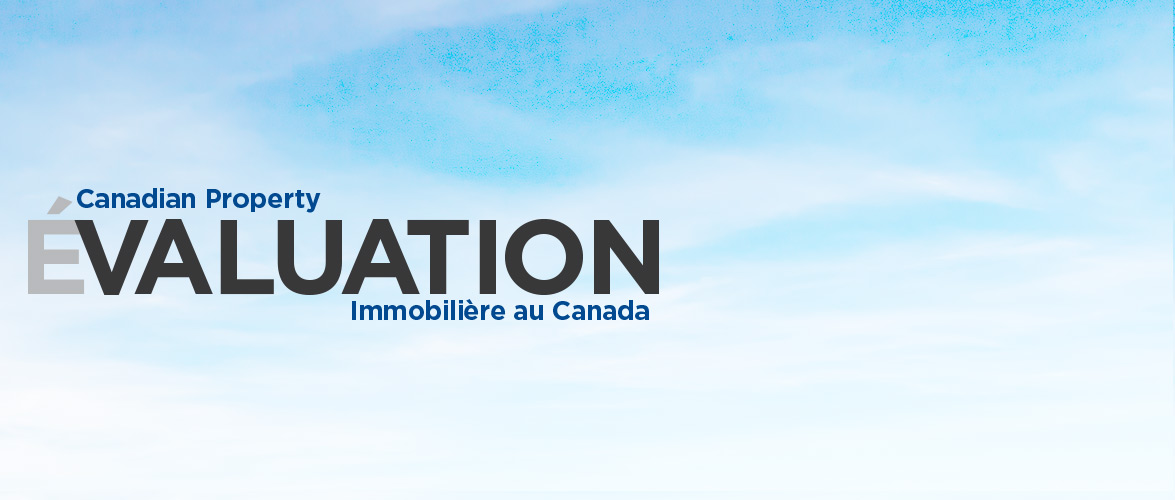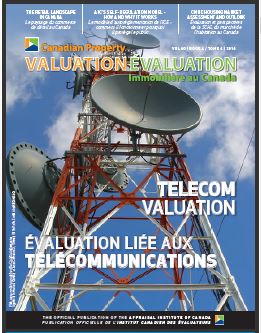Self-Regulation
Canadian Property Valuation Magazine
Search the Library Online
AIC’s self-regulation model: how it works and why it successfully protects the public
By Richard Colbourne, AACI, P. App.
President Elect, Volunteer, AIC Professional Practice Committee
The effectiveness of the self-regulation of an industry or profession is continually being scrutinized by the public and government as they strive to minimize risk and protect consumers. Self-regulation is critical to the sustainability of a profession as it ensures accountability and garners respect, trust and credibility for the professional designation among its clients, the public and regulators within the marketplace.
With close to 80 years as the leading property valuation association in Canada, the Appraisal Institute of Canada (AIC) is recognized as a successful example of a self-regulating organization. It has built a professional culture of integrity and accountability among its Members and, most importantly, has effectively protected the intended user of valuation services by ensuring that the AIC provides the highest quality of valuation professionals. The key components to AIC’s self-regulation model are outlined below, as well as why it successfully protects the public and its clients.
AIC’s governance model is strong and effective
AIC is committed to good governance that is supported by a strong foundation of a robust strategic plan, policies and regulations.
The AIC is governed by a national Board of 14 member-elected Directors. It works collaboratively with its 10 provincial affiliate associations to grant the distinguished Accredited Appraiser Canadian Institute (AACITM) and Canadian Residential Appraiser (CRATM) designations.
The designation process provides Members with the knowledge and skills to provide unbiased professional services such as real property appraisal, appraisal review, consulting, reserve fund planning, and the appraisal of machinery and equipment.
AIC is guided by Bylaws, Regulations, Canadian Uniform Standards of Professional Appraisal Practice (CUSPAP), and a Code of Conduct to ensure that:
- the integrity of the profession is maintained;
- Members engage in conduct that will instill confidence and protect the public interest;
- Members provide quality services within their areas of competence;
- Members commit themselves to principles that reflect high standards of professionalism; and
- Members are held accountable for adherence to these standards through a rigorous complaints and disciplinary process.
At the core of AIC’s strategy is its mission is “to promote and support our Members in providing high quality property advisory services for the benefit of clients, employers and the public.” To achieve this mission, the national body sets national standards, regulations and policies, in consultation with the industry and membership. The provincial affiliates support the implementation of these guidelines. Furthermore, AIC has more than 300 Member volunteers and professional staff at the national and provincial levels who play an active role in the accreditation, professional practice and regulation of the Institute.
Member ethics and professional practice is guided by standards
First published by the AIC in 2001, CUSPAP sets the ethics and practice requirements for its Members. Compliance to CUSPAP is a mandatory conduct, practice and professional liability insurance requirement.
CUSPAP provides guidelines that ensure a consumer receives only the highest quality report and service from AIC Members. CUSPAP encompasses six standards: an ethics standard and practice-related standards dedicated to five key professional services, including the:
- Real Property Appraisal Standard;
- Review Standard;
- Consulting Standard;
- Reserve Fund Planning Standard; and
- Appraisal of Machinery and Equipment Standard.
CUSPAP is reviewed and published on a biennial basis to ensure that the compliance requirements respond to:
- AIC’s commitment to maintaining the highest standards of conduct, analysis and reporting;
- The diversity of AIC Members’ practices;
- The changing industry requirements; and
- AIC Members’ business models.
CUSPAP continues to be AIC’s foundational document. It is integrated into every aspect of the AIC’s operations and strategy and is a key element in our:
- marketing, promotion and government relations;
- self-regulatory regime;
- designation education; and
- Mandatory Professional Liability Insurance Program.
CUSPAP is AIC’s and its Members’ contract to the public we serve.
Comprehensive accreditation process ensures quality valuation professionals
The AIC Professional Designation Program provides a leading-edge curriculum that is based on theoretical and practical experience within the industry. It ensures that Candidate Members proceeding to the AACI or CRA designation have an educational foundation that prepares them to meet the ever-changing demands of a multi-disciplinary profession and complex market conditions
The accreditation process sets the bar high every step of the way. It includes an admission requirement, education requirement, Work Product Reviews, Applied Experience Program and Exam, and, finally, a Professional Competency Interview. A university degree is required to obtain an AIC designation.
The AIC’s Program of Professional Study is seen as a ‘gold standard’ nationally and internationally. In fact, AIC is the only organization in the world to have its accreditation process offered in both official languages, an offering that was recognized in June 2016 through a Memorandum of Understanding between the AIC and The European Group of Valuers’ Associations (TEGoVA). Organizations in the United States, Europe and Australia, to name a few, have looked to, adopted or adapted their policies to AIC’s accreditation process and/or valuation standards.
The English Program of Professional Studies is developed and delivered in partnership with the Real Estate Division of the Sauder School of Business, University of British Columbia. The French Program of Professional Studies is delivered in partnership with the Université Laval in Quebec. Both universities offer the program in class and through distance learning, offering students in Canada and around the world access to curriculums in the language of their choice.
All Members require Continuous Professional Development
To ensure ongoing competency, AIC Members are required to obtain 24 credits in each two-year cycle under its Continuing Professional Development (CPD) Program. Of the 24 credits, seven must be from AIC’s mandatory Professional Practice Seminar, with 17 discretionary credits from industry-related educational programs or training. Failure to obtain the required CPD credits within the two-year cycle results in a suspension of membership and a fine.
Complaint Resolution Process protects the public
The AIC is committed to being responsive, transparent and accountable to the public. AIC has a Complaint Resolution Process that is focused on protecting the public interest and maintaining the excellence of the profession and the services its Members provide to the public.
The Complaint Resolution Process does not arbitrate or determine value but rather focuses on adherence to the professional services and ethics standards set out in CUSPAP. The AIC focuses its investigation and adjudication on formal complaints, where it is alleged that a Member has contravened CUSPAP, the Institute’s Bylaws, Regulations, Policies and Professional Liability Insurance Program. Section 5 of the AIC Consolidated Regulations provides the guidance that governs professional practice and the disciplinary process from the initial reception of a complaint to the final outcome. It also defines the roles of the parties and the sub-committees that are part of the Complaint Resolution Process.
AIC has a committed resource at National Office to address consumer and member concerns and enquiries. The Director, Professional Practice serves as the first point of contact for consumers and members to respond to various questions and concerns related to the conduct and/or practice of an AIC Member. The Director is responsible for registering consumer and member complaints in a confidential and expedient way and directs complaints to the Counsellor, Professional Practice for investigation.
Depending on the nature of the allegations and the extent of the breaches, a complaint may be resolved by the Counsellor; referred to and resolved by the Advocate, with the support from the Investigating Sub-Committee; or heard before and decided by the Adjudicating or Appeal Hearing Panels.
The outcome of a complaint may include one or more practice and/or conduct sanctions including but not limited to:
- Practice Sanctions: direct the Member to take continuing professional development courses or courses from a specific program of professional studies; direct to the Member to submit work product for peer review; reprimand
- Conduct Sanctions: suspension (e.g., of designation, of membership, of co-signing privileges); censure (with or without publication); expulsion
- Fines: up to $10,000
- Investigation Costs: minimum $500
The complaint resolution process is served by Member volunteers from across the country who have extensive experience in valuation and in quasi-judicial and/or judicial settings.
Professional Liability Insurance offers further protection to clients
AIC has a mandatory Professional Liability Insurance Program to protect the public, clients and AIC Members. All Members in good standing are covered for the professional services as set out in CUSPAP, and within their area of qualification and competency. Under the Program, Members receive comprehensive protection, including liability coverage with a limit of $2 million (per occurrence/aggregate per year), as well as legal and defense costs.
Why AIC’s self-regulation works
AIC’s self-regulation has been an integral component of its nearly 80-year history. A commitment to protect the public and deliver quality valuation services to our clients has established AIC as the ‘valuation professionals of choice.’ AIC Members are recognized within Canada as expert witnesses within judicial and semi-judicial settings, and they advise stakeholders within government, the financial industry and the real estate sector on issues relating to the market value of real estate.
AIC’s self-regulation regime is working effectively and the AIC will remain committed to ensuring the accountability of Members to their clients and to delivering quality services to the public they serve.





